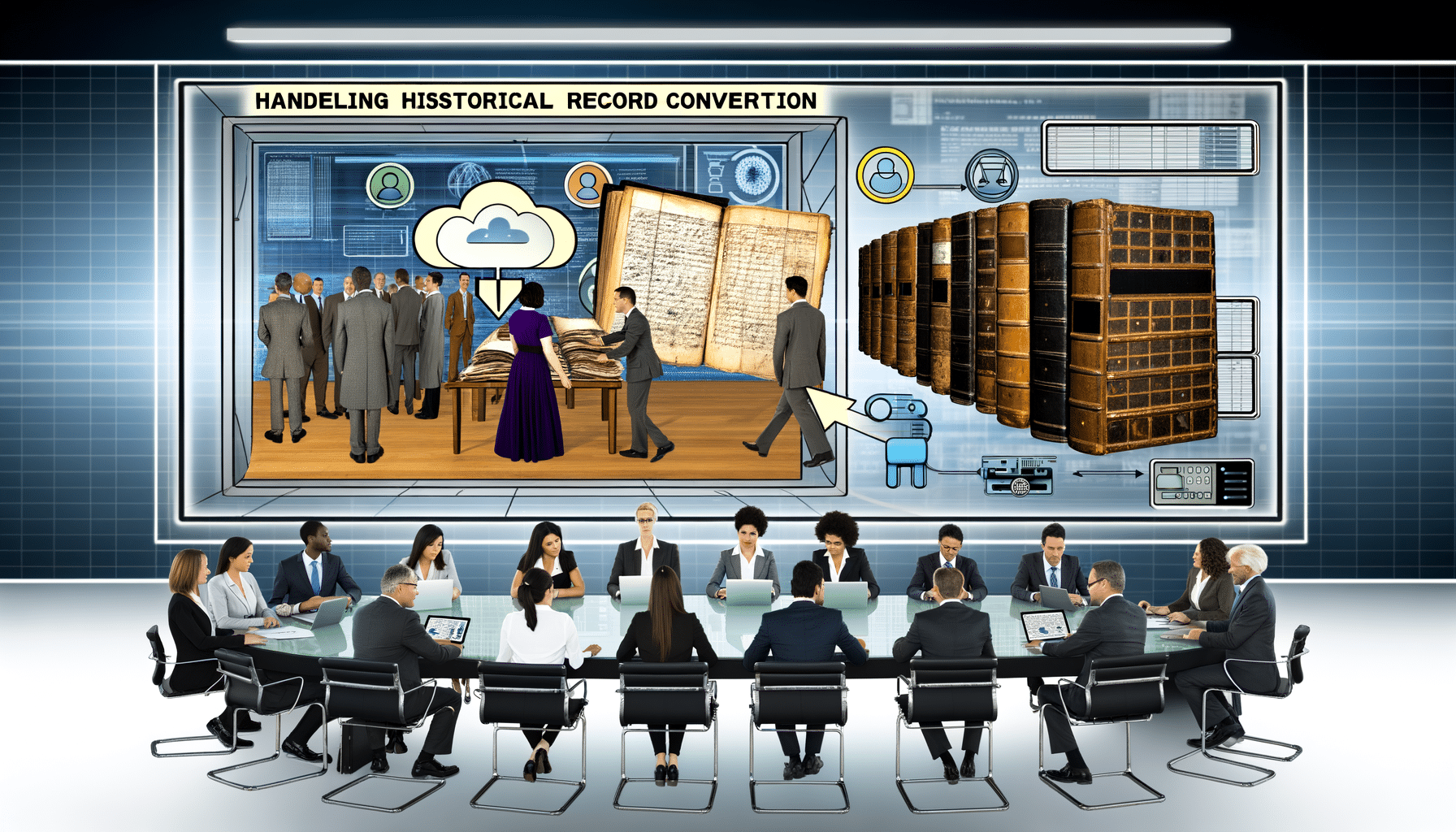- Archives
- December 14, 2024
Handling Historical Record Conversion

Converting Historical Records to Modern Storage Systems—Embracing the Future without Losing the Past
When I founded RecordsKeeper.AI, the importance of managing historical records efficiently was one of the prime challenges I wanted to address. In a world where digital transformation is no longer a choice but a necessity, converting old, paper-based records into modern digital formats is both an art and a science. This process is known as historical record conversion, and it has become pivotal for organizations aiming to safeguard their past while optimizing resources for the future.
Why Convert Historical Records?
Decades worth of data often sit in dusty filing cabinets or storage rooms, acting as dormant assets that could hold significant value. So why is the conversion of such historical records necessary?
- Preservation: Physical records are susceptible to degradation over time. Digitization ensures longevity and preservation.
- Accessibility: Once converted, records are instantly accessible across the globe, facilitating efficient information retrieval.
- Compliance: Many regulatory standards, such as GDPR and HIPAA, require quick access to information, which is feasible with digital records.
- Cost-effectiveness: Reducing storage space and maintenance costs for physical archives.
Embracing record conversion isn’t just about moving with the times; it’s about embracing efficiency and innovation.
The Challenges of Converting Historical Records
Converting historical records involves overcoming several challenges that, at first glance, may seem daunting. Here’s a closer look at what organizations typically face:
- Data Integrity: Ensuring the accuracy and completeness of the records during conversion is crucial.
- Technology Integration: Harmonizing existing systems with new technologies like AI and blockchain can be complex.
- Regulatory Compliance: Maintaining compliance with various industry standards during conversion.
- Resource Allocation: Converting large volumes of data requires time, workforce, and financial resources, which can be a strain, especially for smaller companies.
These challenges, however, are not insurmountable. With the right strategy and tools, the process can be smooth, efficient, and rewarding.
Steps to Efficient Historical Record Conversion
As someone deeply invested in making transformation easier, I’ve identified several steps essential for seamless historical record conversion:
1. Planning and Assessment
Start by evaluating your organization’s current state regarding records and identifying the key objectives for conversion. Understand the volume and types of records you need to convert. This phase also involves setting realistic timelines and budgets.
2. Selecting the Right Tools
Choosing a robust platform that can handle your specific needs is critical. At RecordsKeeper.AI, we leverage AI for automated categorization and blockchain for ensuring data integrity, offering an end-to-end, secure solution for record conversion.
3. Data Cleaning and Preparation
Ensure your data is clean, i.e., free of duplicates and inaccuracies, before conversion. This step saves time and resources, guaranteeing more precise outputs post-conversion.
4. Implementing Conversion
Use technology to automate the conversion process as much as possible. This ensures speed and accuracy. RecordsKeeper.AI’s platform automatically classifies and tags records, streamlining retrieval using natural language queries.
5. Testing and Quality Assurance
After conversion, rigorous testing is crucial to ensure no data is lost or corrupted during the process. This involves comparing old and new data for consistency and accuracy.
6. Continuous Monitoring and Compliance
Once conversion is complete, implement systems to continuously monitor records for regulatory compliance and data integrity. This serves as a proactive step in record management.
Advantages of Using RecordsKeeper.AI
Integrating a comprehensive solution like RecordsKeeper.AI offers unique advantages in the conversion landscape:
- AI-driven insights: RecordsKeeper.AI uses sophisticated AI algorithms to derive insights from data, aiding decision-making processes.
- Enhanced Security: Our secure data rooms and blockchain integration ensure that your records are protected against unauthorized access and tampering.
- Automated Compliance: From GDPR to SOX, automate regulatory workflows with ease.
- Seamless Integration: Our platform easily integrates with existing systems, ensuring continuity with minimal disruption.
Conclusion
Transforming historical records into digital formats is more than just a task; it’s a strategic move towards a more efficient, compliant, and accessible future. Through a thoughtful approach and leveraging platforms like RecordsKeeper.AI, this endeavor becomes a stepping stone to greater operational excellence.
For those looking to modernize their record management strategies while ensuring security and compliance, exploring RecordsKeeper.AI could be the crucial step towards achieving your goals. Let’s embrace the future of record management together!
As always, I look forward to sharing more insights with you, and I’m eager to hear how your record conversion journey progresses. Follow close and reach out to discuss more on how we can innovate the record management space together.
Toshendra Sharma is the visionary founder and CEO of RecordsKeeper.AI, spearheading the fusion of AI and blockchain to redefine enterprise record management. With a groundbreaking approach to solving complex business challenges, Toshendra combines deep expertise in blockchain and artificial intelligence with an acute understanding of enterprise compliance and security needs.
Related Posts

Make Archive Management Fun Again With RecordsKeeper.AI
Transform tedious archiving into an automated process.
- November 16, 2024
Archives
- January 2025
- December 2024
- November 2024
- October 2024
- September 2024
- August 2024
- July 2024
- June 2024
- May 2024
- April 2024
- March 2024
- February 2024
- January 2024
- December 2023
- November 2023
- October 2023
- September 2023
- August 2023
- July 2023
- June 2023
- May 2023
- April 2023
- March 2023
- February 2023
- January 2023
- December 2022
- November 2022
- October 2022
- September 2022
Want to get more content like this?
Signup to directly get this type of content to your inbox!!
Latest Post
Document Control for Equipment Maintenance
- January 20, 2025
Managing Records for Multiple Clients
- January 19, 2025
Handling Conference Documentation
- January 18, 2025
Setting Up Department Record Reviews
- January 17, 2025





